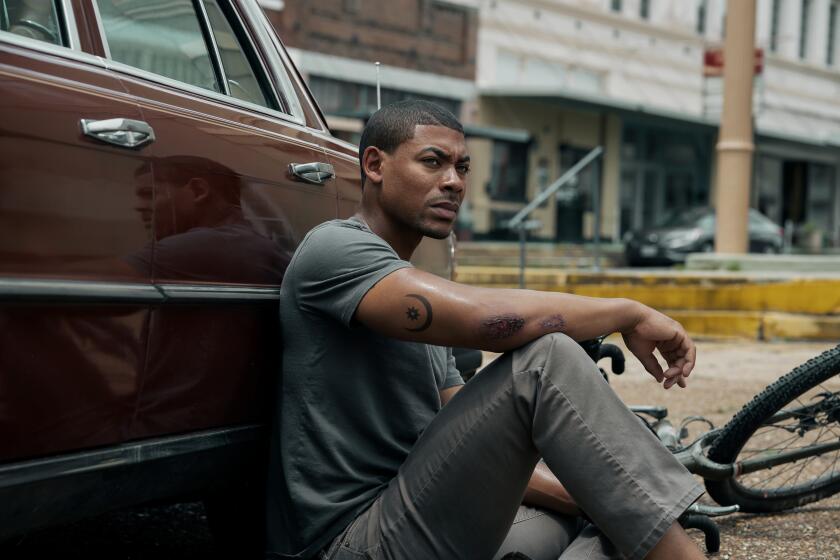‘Seven Pounds’? It’s ‘adrenalic’
Italian neorealism and Will Smith are not concepts that usually go together. The first hearkens to the postwar film tradition of movies like “The Bicycle Thief,” which focused on the problems of everyday people with nonjudgmental compassion, often featuring nonprofessional actors. And then there’s Will Smith, the biggest movie star in the world, with an unparalleled string of eight blockbusters in a row.
The task of marrying these disparate worlds has fallen to director Gabriele Muccino, a lanky 41-year-old who barely spoke English when he paired with Smith a few years ago on the story of a homeless man’s against-all-odds success in “The Pursuit of Happyness.”
This time, Muccino, who has become Smith’s go-to guy for making films about the underclass, leads the actor through an even more challenging story with “Seven Pounds,” in which Smith again sheds his bankable cocky-but-charming persona to play a suicidal man making amends for his role in a fatal car accident.
It is a dark and complicated movie, which has generated mixed reviews and earned just $16 million at the box office this past weekend, Smith’s lowest opening take in recent memory.
But then, Muccino knew it would be tough to pull off. “It was the most challenging, difficult, complex and ambitious movie I had ever read,” he says of the script.
Just three years ago, the director was living in Rome making films when he read an interview Smith gave to an Italian newspaper about his appreciation for Muccino’s 2001 film “The Last Kiss.” Muccino sent the newspaper clip to his agents in Hollywood, and shortly afterward he met with Smith in Paris, where the actor was promoting “Hitch,” to discuss directing “The Pursuit of Happyness.”
Smith explains what he saw in “The Last Kiss”: “I could tell that none of the actors in the film were world-class actors with 10,000 hours of experience. Everybody was new, yet everybody gave fantastic performances. The only way that happens is because the director crafted all their performances.” Smith also liked that Muccino told him that “an American shouldn’t direct ‘Pursuit of Happyness’ because Americans don’t understand the American dream.”
Muccino recalls over wine and soup at an Italian restaurant in Los Angeles that he told Smith, “I want to take the mask off your face and find different feelings that you don’t usually display.”
At that time, Muccino also had to complete the film in 150 words or fewer, which was about the extent of his English vocabulary. “Sometimes, I barely understood what people were talking about,” he says now with a laugh. “It was all about instinct and guts. Particularly with Will, I had to use sounds.”
Smith offers up a demonstration of Muccino’s technique sounding much like a long string of vowels pushing through a container of marbles. “That’s an actual quote,” the actor says. “He used analogies too. He’ll say, ‘You are like a wolf, and you are in the jungle. You feel strong, but you feel alone.’ ”
For their efforts, Smith received an Oscar nomination and Muccino’s English improved. (Though he still makes charming mistakes, creating words like “adrenalic,” which appears to be a combination of “adrenaline” and “energetic.”)
As he did on “Happyness,” Muccino devoted a month to rehearsing, holed up with the actors to hammer out the script and characters, but also to distill “the need for relatability with what is real outside your room. You have to be honest and respectful of the real life that real people are experiencing every day.”
That’s his legacy of Italian neorealism talking. There is a soft political undertone to Muccino’s vision, a kind of sympathy for ordinary Americans who struggle to get by. “The American society is very cynical, very severe with those who fail. There is no safety net. When you fail, you fail straight down,” Muccino says.
Yet “Seven Pounds” examines themes of altruism and sacrifice.
“The idea that you have somebody who helps you and protects you is much more needed here than in Europe, where the society protects you more,” Muccino notes. “It’s something this country has to solve as soon as possible. It’s going to be a huge problem.”
--
rachel.abramowitz@latimes .com
More to Read
Only good movies
Get the Indie Focus newsletter, Mark Olsen's weekly guide to the world of cinema.
You may occasionally receive promotional content from the Los Angeles Times.










